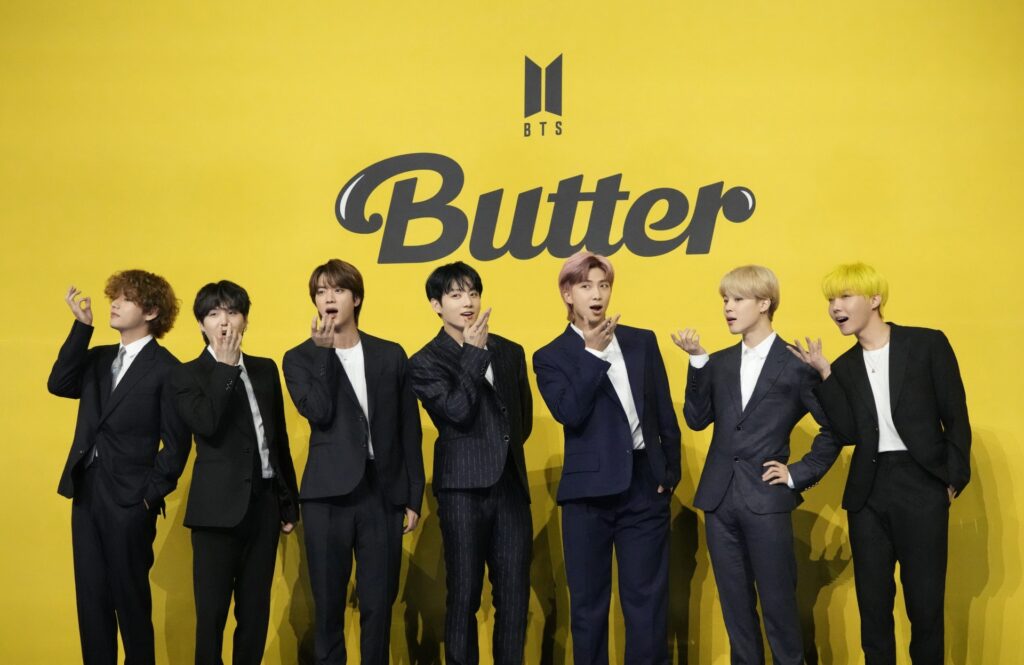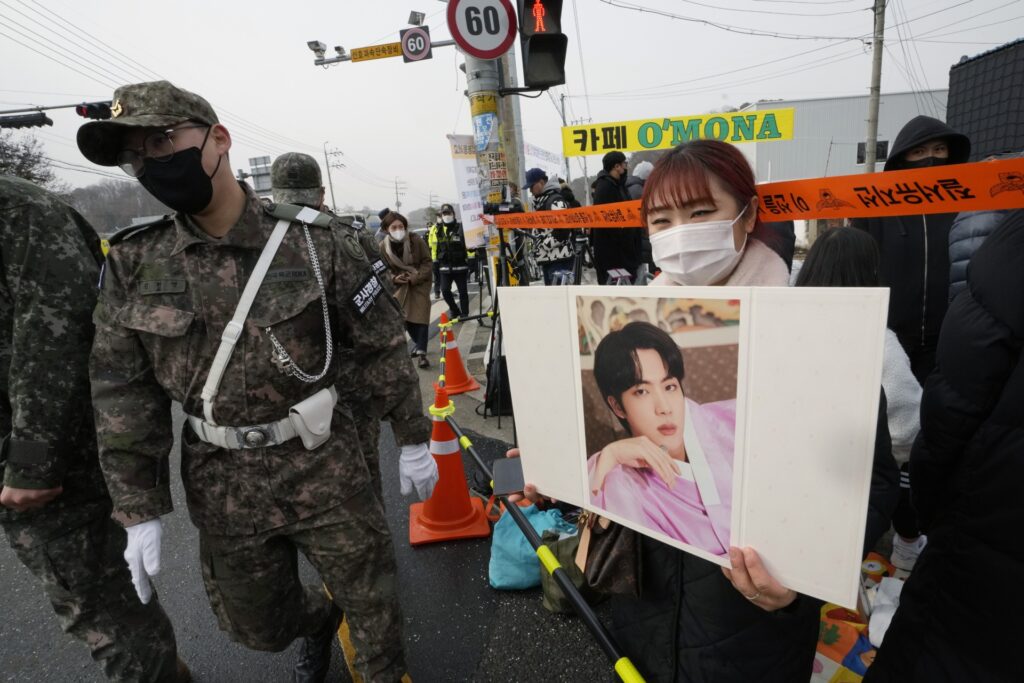South Korean record label Hybe, the home of international superstar boy band BTS, announced on Tuesday that it had signed a deal with the Chinese entertainment giant Tencent to make its music available in the communist country.
Korean pop music, or K-pop, is extremely popular in China, but without cooperation with China’s largest regime-friendly entertainment companies, foreign record labels do not profit from the distribution of their intellectual property. The Chinese government has pushed back against the popularity of the genre in the past by outright banning South Korean acts in response to Seoul’s political alignment with the United States and shutting down social media fan communities to keep trending fandoms from growing.

Members of South Korean K-pop band BTS, V, SUGA, JIN, Jung Kook, RM, Jimin, and j-hope from left to right, pose for photographers ahead of a news conference to introduce their new single “Butter” in Seoul, South Korea, May 21, 2021. (AP Photo/Lee Jin-man)
A deal between China’s largest entertainment company and the record label behind BTS seems a poor fit both due to the general hostility that the Chinese government has displayed towards Korean entertainment and its animosity towards that band in particular. BTS’s band members have publicly expressed appreciation for America’s support of South Korea in the Korean War, regularly thank American fans for their support, and received a warm welcome at the White House last year for a meeting with leftist President Joe Biden to discuss anti-Asian racism.
The band announced a hiatus shortly after meeting with Biden that has allowed its members to fulfill the mandatory military service South Korea demands of its young men in preparation for any potential escalation of the 70-year-old war with one of China’s closest allies, North Korea. The band confirmed in October that its oldest members would begin at least two years of military service in 2023, sidelining them as a band through at least 2025.
The conservative government of South Korean President Yoon Suk-yeol has hinted at the potential of occasional BTS joint performances even as they serve, however, suggesting that the band could help promote military recruitment and patriotism.

A fan waits for K-pop band BTS’s member Jin to arrive before he enters the army to serve near an army training center in Yeoncheon, South Korea, Tuesday, Dec. 13, 2022. Jin, the oldest member of K-pop supergroup BTS, was set to enter a frontline South Korean boot camp Tuesday to start his 18 months of mandatory military service, as fans gathered near the base to say goodbye to their star. (AP Photo/Ahn Young-joon)
“They should come to the military, and I believe there will be a way for us to give them the opportunity to practice as well as allow them to leave the country and perform anytime if they have overseas concerts scheduled,” Defense Minister Lee Jong-sup said in August. “Many people do think highly of military service itself, and I think (BTS members enlisting) can actually help them with their popularity.”
Band member J-Hope announced on Wednesday that he had completed his basic military training, posting a photo in uniform to the official Hybe fan community.
[230524 J-hope Weverse Post]
🐿 armys !!! ive completed <training> well.
the letters and support that you have all sent have been a great help, that i was able to work hard while receiving training!!!ill continue to work hard and show you good sides of me during the rest + pic.twitter.com/XGi10kbrRu
— 미니융 (@miiniyoongs) May 24, 2023
Though BTS is by far Hybe’s most lucrative act, the company posted its biggest first-quarter profits in May, largely as a result of the band members still not in the military service producing solo material.
The Chinese government, through its state media arms, condemned BTS in 2020 for thanking America for the “sacrifices” of its soldiers during the active era of the Korean War from 1950 to 1953. State propaganda outlets demanded BTS also thank Chinese soldiers, who were fighting against South Korea alongside the North. The media arms never clarified what the boy band should have been thanking the Chinese for, given their status as the enemy in that war.
While some members of BTS are continuing to release solo materials while others serve in the military, the Chinese government appears to have greenlit Hybe’s entry into its music market. The Tencent agreement, Korea JoongAng Daily reported on Tuesday, would grant Chinese citizens access to BTS’s catalogue, along with Hybe’s other artists, in a way that kicks money back to the company.
“Although HYBE’s music was streamed within China before the deal, the lack of a contract meant that profit made from music distribution was not fully reflected in the K-pop agency’s revenue,” JoongAng explained.
Hybe joins several other South Korean record labels – most prominently the two previously dominant agencies, YG Entertainment and SM Entertainment – in partnering with Tencent, a massive platform featuring both television and music streaming as well as video games and other entertainment. Tencent is largely friendly to the Communist Party – the company prominently dumped its share of financial support for Top Gun: Maverick after producers refused to censor a Taiwanese flag in the image or water down the heroism of its American protagonists – but has faced communist persecution in the past in the form of “anti-trust” actions meant to prevent it from operating independent of the wishes of the Party.
JoongAng noted that economic expert opinions on the potential success of the partnership vary. Some analysts suggested that Hybe has much to gain from the formal distribution of its content to China now that the Communist Party has “optimized” its Wuhan coronavirus protocol, indefinitely ending city-wide lockdowns and letting citizens travel abroad.
“Due to the lifting of travel restrictions between Korea and China in March, China’s K-pop fans are back in Korea,” analyst Lee Hwa-jeong of NH Investment & Securities told the Korean newspaper. “Profitable earnings are expected from K-pop agencies who have artists with strong fandom in China, such as HYBE’s Seventeen, JYP Entertainment’s Stray Kids and YG Entertainment’s Blackpink as they are scheduled to host world tours [including China] in the latter half of this year.”
Others, JoongAng noted, recalled the extensive censorship of Korean entertainment in China and suggested the Party could, at any time, “ban or regulate certain content for political reasons.”
BTS is not an overtly political music act. The group’s discography mostly includes love songs or dance hits about being young and cool. The unprecedented international success of the band has turned it into an inevitable political asset, however, as the South Korean government leverages K-pop as “soft power” to strengthen its diplomatic profile abroad.
In 2020, the Korea Society, an organization dedicated to Seoul-Washington ties, awarded BTS its James A. Van Fleet Award, offered to “distinguished Koreans or Americans in recognition of their outstanding contributions to the promotion of U.S.-Korea relations.” The band took the opportunity to express appreciation for America – angering China and preceding its censorship in the communist country.
“The Korea Society’s 2020 Annual Gala is especially meaningful, as this year marks the 70th anniversary of the Korean War,” RM, the band’s lead vocalist and most proficient English speaker, said in his acceptance speech. “We will always remember the history of pain that our two nations shared together and the sacrifices of countless men and women.”
The Global Times, a Chinese government propaganda outlet, attacked BTS as somehow offending Chinese sensibilities with those remarks, calling America the “aggressor” of the Korean War and demanding the South Korean band thank the Chinese soldiers killing their brethren on the battlefield.
“There were thousands of Chinese soldiers who sacrificed their lives in the war. You are South Korean people and you can say that, but I am Chinese so I decided to be angry and quit the boy band’s fan club to express my clear attitude,” an alleged BTS former fan was quoted in the newspaper as saying.
The Communist Party has taken to using the Korean War for nationalistic purposes, producing multiple Chinese box office blockbusters dedicated to the alleged heroism of its communist troops against the Americans in the conflict.
A year later, the Global Times would go on to condemn Big Hit Entertainment, the entity that preceded Hybe, and BTS by proxy for allegedly using an accurate map of India in a corporate report that did not identify parts of the country as China’s “South Tibet.” China illegally claims much of northern India, causing regular military conflicts on their mutual border.
Following both the Korean War and Indian map controversies, Chinese entertainment companies censored BTS out of the 2021 Friends reunion, alongside other apparently offensive individuals such as Lady Gaga and Justin Bieber. The Chinese government also shut down multiple large-scale social media sites for BTS fans in May 2021 in anticipation of the band’s latest single, on the grounds that they promoted “inappropriate behavior.”
Follow Frances Martel on Facebook and Twitter.


